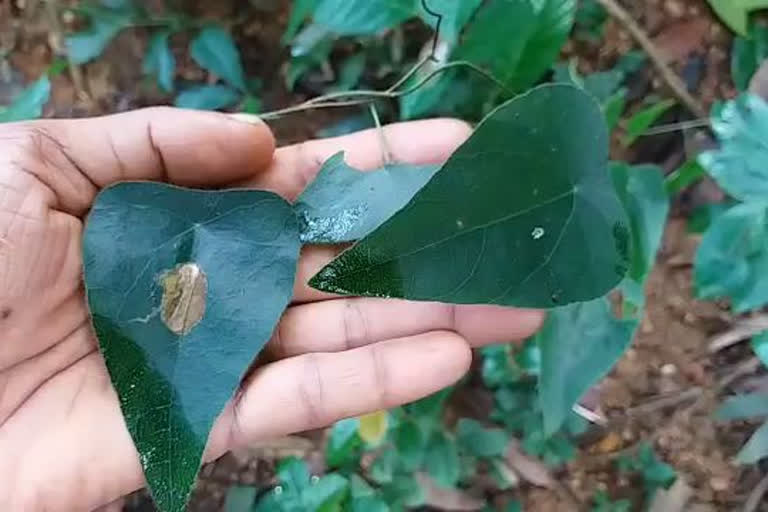Mangalore: Mangalore University has obtained its first patent for an invention by its two plant researchers Prof. K.R. Chandrashekar and Bhagya Nekrakalaya relating to an anti-cancer compound last week. Their invention is titled 'A Process For The Extraction And Purification Of Tetrandrine'.
The invention describes a process for the extraction and purification of tetrandrine from methanol extract of Haade Balli (Cyclea Peltanta). It is a plant collected from the forests of Dakshina Kannada and Kasaragod district of Kerala.
Speaking to ETV Bharat, Prof. Chandrashekar said, "We have seen the people applying the paste of Haade Balli or Cyclea Peltanta leaves on the head to cool the body. We decided to conduct research on it, and we found presence of many other factors, especially Tetrandrine. China has already started researching on this. However, Mangalore University is the first to begin the research on it in our country. Now, Mangalore University got a patent but funds are needed to carry out further research. Therefore, if any pharmaceutical company joins hand with the university anti-cancer medicine will be out."
The duo first conducted research on Tetrandrine in 2014-15 and identified the presence of tetrandrine in Haade Balli (Cyclea Peltanta). The university had applied for the patent in 2017. But now, it got a patent valid for 20 years. It is the first patent granted to Mangalore University, the first institution to launch a research on tested tetrandrine's (Haade Balli) anti-cancerous potential using cancer cells.
Furthermore, they developed a simple process for its extraction from the plants and purification into a single molecule from a complex mixture using a simple glass column chromatography technique.
It is also reported to have anti-toxin function, besides playing a role in improving diabetic disorders of skin, like boils and carbuncle and in the treatment of smallpox and stomach ache. Pharmacological studies also proved the bioactive potential of Cyclea Peltanta with antioxidant, anti-diabetic, anti-inflammatory, cytotoxic activities and protection against nephrotoxicity and oxidative damage.
Currently, Chandrashekar and Nekrakalaya are working in the Research Centre of Yenepoya University (Deemed to be University) in Mangalore.
Also read: Scientists develop potato with cancer fighting properties in Shimla



